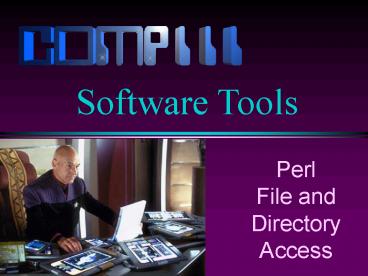Perl File and Directory Access PowerPoint PPT Presentation
1 / 19
Title: Perl File and Directory Access
1
Software Tools
- Perl File and Directory Access
2
Changing Directories
- You can change the current working directory
within Perl, just like the cd shell command. - In Perl, the chdir function, takes a single
argument -- the directory name to change to. - chdir returns true if youve successfully changed
to the requested directory, and false if you
could not. - chdir("/etc") die "cannot cd to /etc"
3
Changing Directories
- Like other functions, parentheses are optional
- cat cd1
- !/usr/local/bin/perl5 -w
- print "where to go? "
- chomp(where ltSTDINgt)
- if(chdir where)
- print "chdir succeeded, now in where\n"
- else
- print "chdir did not succeeded\n"
- cd1
- where to go? /bin
- chdir succeeded, now in /bin
4
Changing Directories
- When your Perl program starts, the current
working directory will be inherited from the
shell that invoked it. - However, using chdir in Perl will not change the
working directory of the shell when your program
ends. - The chdir function without a parameter defaults
to taking you to your home directory.
5
Globbing
- The shell takes a and turns it into a list of
all the filenames in the current directory. - Similarly, a-m.cpp turns into a list of all
filenames in the current directory that begin
with a letter in the first half of the alphabet,
and end in .cpp. - The expansion of or /etc/host into the list of
matching filenames is called globbing.
6
Globbing
- Perl supports globbing.
- Just put the globbing pattern between angle
brackets or use the glob function - _at_all ltgt
- _at_b lta-m.cppgt
- _at_c glob("a-m.cpp") same as _at_b
- In a list context, the glob returns a list of all
names that match the pattern (or an empty list if
none match).
7
Globbing
- Example
- ls
- address letter1 names sort
- cat glob1
- !/usr/local/bin/perl5 -w
- _at_files lta-mgt
- foreach file (_at_files)
- print "file\n"
- glob1
- address
- letter1
8
Globbing
- If you use a full pathname in your glob, you will
get full pathnames as a result - cat glob2
- !/usr/local/bin/perl5 -w
- _at_files lt/etc/hostgt
- foreach file (_at_files)
- print "file "
- print "\n"
- glob2
- /etc/hostname.le0 /etc/hosts /etc/hosts.allow
/etc/hosts.deny
9
Globbing
- If you want just the simple filename, you can use
substitute to chop off the directory part of the
string - cat glob3
- !/usr/local/bin/perl5 -w
- _at_files lt/etc/hostgt
- foreach file (_at_files)
- file s./ delete to last slash
- print "file "
- print "\n"
- glob3
- hostname.le0 hosts hosts.allow hosts.deny
10
Globbing
- Multiple patterns are permitted inside the glob
- _at_bill_files ltgates clintongt
- The argument to glob is variable interpolated
- cat glob4
- !/usr/local/bin/perl5 -w
- if(-d "/homes/horner/111")
- where "/homes/horner/111"
- else
- where "/homes/horner"
- _at_files ltwhere/gt
- print "_at_files\n"
- glob4
- /homes/horner/111/letter1 /homes/horner/111/name
s
11
Removing a File
- The Perl unlink function deletes a file, exactly
like the UNIX rm command. - unlink("bill") bye bye bill
- Example
- ls
- letter1 names unlink1
- cat unlink1
- !/usr/local/bin/perl5 -w
- print "what file to delete? "
- chomp(what ltSTDINgt)
- unlink(what)
- unlink1
- what file to delete? letter1
- ls
- names unlink1
12
Removing a File
- unlink can take a list of names as well
- unlink("bill", "gates")
- unlink lt.cppgt delete all .cpp files
- The return value on unlink is the number of files
successfully deleted. - foreach file (lt.cppgt)
- if(unlink(file) 0)
- print "trouble deleting file\n"
13
Removing a File
- With no arguments to unlink, _ is used as the
default. - foreach (lt.cppgt)
- if(unlink 0)
- print "trouble deleting _\n"
14
Renaming a File
- The Perl function rename allows you to rename
files. - Here is how to rename the file gates into cheap
- rename("gates", "cheap")
- rename returns a true value if successful.
- if(rename("gates", "cheap"))
- print "Bill is now cheap\n"
- else
- print "Bill is still gates\n"
15
Hard Links
- The Perl function link allows you to create a
hard link. - Here is how to link from the file gates to cheap
- link("gates", "cheap")
- link returns true if successful.
- if(link("gates", "cheap"))
- print "Bill is now also cheap\n"
- else
- print "Bill is still only gates\n"
16
Soft Links
- The Perl function symlink allows you to create a
soft (symbolic) link. - Here is how to symbolic link from gates to cheap
- symlink("gates", "cheap")
- readlink returns the name pointed at by the
specified symbolic link - symlink("gates", "cheap")
- x readlink("cheap")
- print "cheap points at x\n" cheap points at
gates
17
Making and Removing Directories
- The Perl functions mkdir and rmdir allow you to
make and remove directories. - mkdir takes the name of the new directory and a
mode that determines the permissions - Use 0755 for the mode to allow user full (rwx)
permission, and no write permission for group and
other (rx only). - mkdir("gatesdir", 0755)
- rmdir("gatesdir")
18
Permissions
- The leading mode number is always 0, and the
other 3 numbers are permissions for user, group,
and other respectively. - The mode values are octal, and have the following
meanings - 0 ---
- 1 --x
- 2 -w-
- 3 -wx
- 4 r--
- 5 r-x
- 6 rw-
- 7 rwx
19
Modifying Permissions
- The Perl function chmod allows you to change file
and directory permissions - mkdir("gatesdir", 0755) urwx grx orx
- chmod(0750, "gatesdir") urwx grx o
chmod(0531, "gates") urx gwx ox - chmod(0642 , "gates", "cheap") urw gr ow

